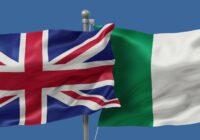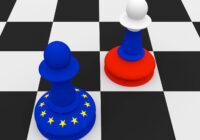I have always believed that the independence of members of the European Commission (EC) was a keystone of successful European integration. Commissioners are obliged by their oath of office to seek a European solution to problems, rather than just seek a balance between conflicting national interests. They have done so ever since 1958. This is why European integration has succeeded, while integration efforts on other continents have failed under the weight of national egoism.
As the European Union grows, the independence of commissioners from national politics has become ever more important. Some believe the European Commission is too large. From an efficiency point of view, they have a point. But Ireland, among others, has insisted that despite this, each member state should have one of its nationals as a member of the commission at all times.
No Credible Alternative to the US Grand Strategy in Europe
But if the one-commissioner-per-member-state rule is to be upheld as the EU enlarges, commissioners from all states — large and small — must demonstrate that they put European interest first and are not subject to the vagaries and passions of politics in their country of origin. In other words, European commissioners must be independent. All member states must be seen to respect this.
This is why I am deeply troubled by the attitude taken by the Irish government, and then by President Ursula von der Leyen of the European Commission, to call for Phil Hogan to resign as EU trade commissioner. Both of them failed in their understanding of the European Union and of one of its vital interests — namely the visible independence of members of the European Commission from the politics of any EU state, large or small.
I was genuinely shocked by what happened. Late in the evening of August 22, leaders of the Irish government called on Hogan to “consider his position.” That means to resign. They piled on the pressure thereafter, with a further statement on August 23 containing a political determination that he had broken the government’s quarantine rules to combat the spread of COVID-19 after returning to Ireland from Belgium. Hogan resigned on August 26. That was his decision and one he was entitled to make.
Lessons From This Precedent
But there are profound lessons to be learned by President von der Leyen — and by the European Commission as a whole — as to how and to whom commissioners should be held accountable, and a need to understand what this precedent means for the future political independence of commissioners from their home governments. Separately, there are also questions to be asked about the internal management of and the collegiality of the EC.
I will set out my concerns here, drawing on the words of the EU treaty, which I helped draft as a member of the Convention on the Future of Europe.
On August 26, von der Leyen clearly withdrew any active support from Commissioner Hogan and unquestioningly accepted the line of the Irish government. This influenced him to resign from his position. In this action, I contend that the president did not fulfill all of her responsibilities under the treaties. I know she faced genuine political difficulty. But the treaties were framed to deal with fraught political situations while preserving the independence of the EC and due process.
The European Commission is the guardian of EU treaties and should be seen to defend the rules laid down in the treaties under all circumstances, even when it is politically difficult. Article 245 of the treaty requires member states to respect the independence of commissioners. Ireland is bound by that article, after having ratified it in a referendum. One should note that Article 245 refers to respecting the independence of commissioners individually, not just to the EC as a whole.
It is for the Irish government to say whether publicly demanding a commissioner’s resignation for an alleged breach of Irish rules is compatible with the Irish government’s treaty obligation under Article 245. But it had other options,
If a commissioner is visiting a member state for any reason, he or she is subject to the laws of that state on the same basis as any other citizen. A visiting commissioner would not be above the law, nor would they be below it either. If they breached the law, due process in the courts ought to be applied — as with any citizen. This is what would have happened if the visiting commissioner was from any country other than Ireland and had experienced the difficulties that Hogan did, and due process would have been followed.
The statements of the Irish government, and the unsatisfactory explanations by Hogan, created political problems for von der Leyen. She had to do something, but not necessarily what she did. Yet there were options available to her, which she inexplicably failed to use or consider.
Rules Ignored
Commissioners are subject to a code of conduct. Under that code, there is an ethics committee to determine if its guidelines have been breached. If the matter is urgent, there is provision for a time limit to be set for a report by the committee. Nonetheless, a reference to the ethics committee would have allowed for due process and a calm and fair hearing. More importantly, using this process would also have asserted the independence of the European Commission as an institution.
The code says that it is to be applied “in good faith and with due consideration of the proportionality principle,” and it allows for a reprimand that does not warrant asking the commissioner to resign. Due to the course followed, we will never know if there was any breach of the code at all by Hogan.
President von der Leyen’s failure to use these mechanisms seems to be a serious failure to defend due process and proportionality and to protect the independence of individual commissioners, as was required by the treaty. The EC and the European Parliament should inquire into why she did not do so. There are consequences now for the viability of the code of conduct if it is not to be used in a case like this.
Criteria Not Applied
Was what Phil Hogan did a resigning matter anyway? Article 247 allows for only two grounds for asking a commissioner to resign. These are that he or she is “no longer being able to fulfil the conditions for the performance of [their] duties” or “has been guilty of serious misconduct.” I do not think either condition was met in Hogan’s case.
Hogan would have been fully capable of carrying out his duties while the ethics committee did its work. Instead, his position is now effectively vacant.
Most people I have spoken to do not think the breaches committed by Hogan — while foolish — amounted to “serious misconduct” within the meaning of Article 247. Failure to recollect all the details of a private visit over two weeks, or to issue a sufficient apology quickly enough, may be political failing, but they hardly rise to the level of “serious misconduct.” Any deliberate and knowing breach of quarantine measures should have been dealt with in Irish courts without fuss.
In any event, von der Leyen would have been far wiser to have gotten an objective view on all of this from the ethics committee before allowing Hogan to resign.
Why Did the European Commission Not Meet?
Another issue is the president’s failure to call an EC meeting if she was considering that a commissioner should resign. Under Article 247, it is the EC — not the president alone — that can make a commissioner resign, and even then it must be approved by the European Court of Justice. These safeguards were put in the treaty to protect the independence of the European Commission. They were ignored in this case.
The subsequent weakening of the institutional independence of the commission is very damaging to European integration and to the interests of smaller EU states. This should be of concern to the European Parliament.
The views expressed in this article are the author’s own and do not necessarily reflect Fair Observer’s editorial policy.
Support Fair Observer
We rely on your support for our independence, diversity and quality.
For more than 10 years, Fair Observer has been free, fair and independent. No billionaire owns us, no advertisers control us. We are a reader-supported nonprofit. Unlike many other publications, we keep our content free for readers regardless of where they live or whether they can afford to pay. We have no paywalls and no ads.
In the post-truth era of fake news, echo chambers and filter bubbles, we publish a plurality of perspectives from around the world. Anyone can publish with us, but everyone goes through a rigorous editorial process. So, you get fact-checked, well-reasoned content instead of noise.
We publish 2,500+ voices from 90+ countries. We also conduct education and training programs
on subjects ranging from digital media and journalism to writing and critical thinking. This
doesn’t come cheap. Servers, editors, trainers and web developers cost
money.
Please consider supporting us on a regular basis as a recurring donor or a
sustaining member.
Will you support FO’s journalism?
We rely on your support for our independence, diversity and quality.






